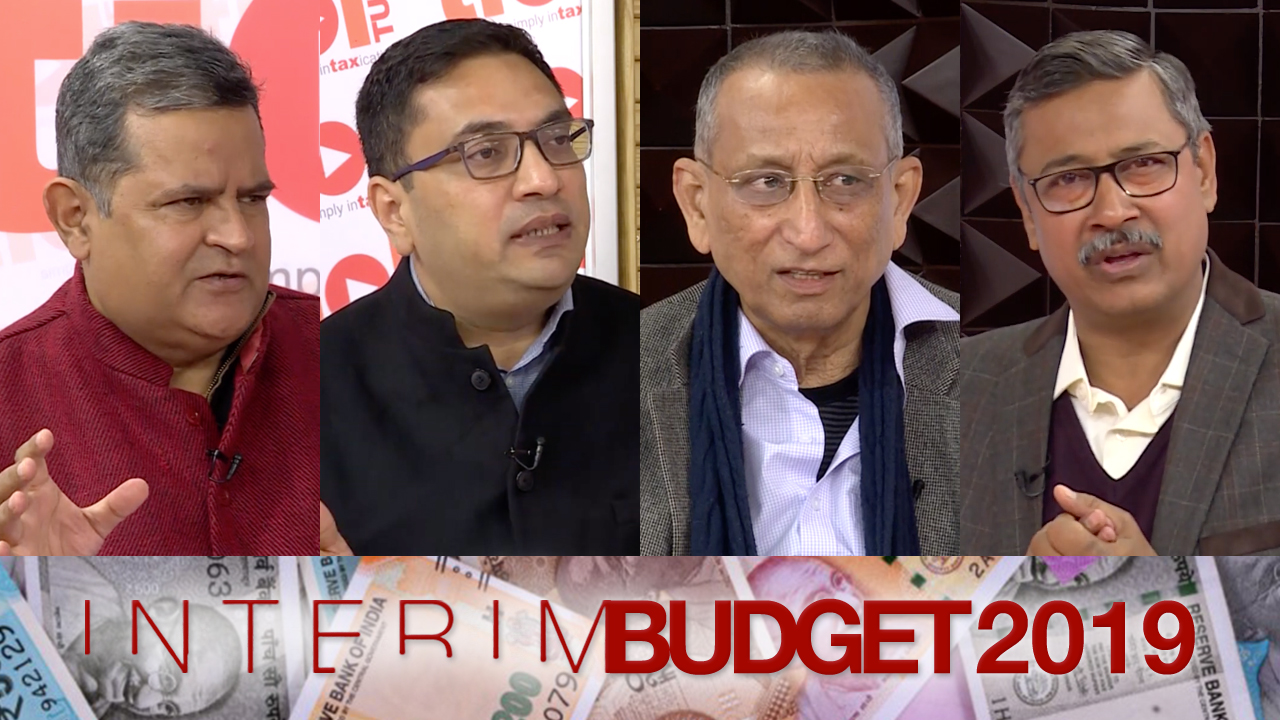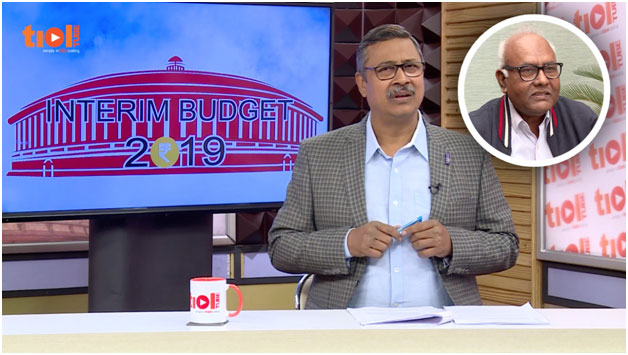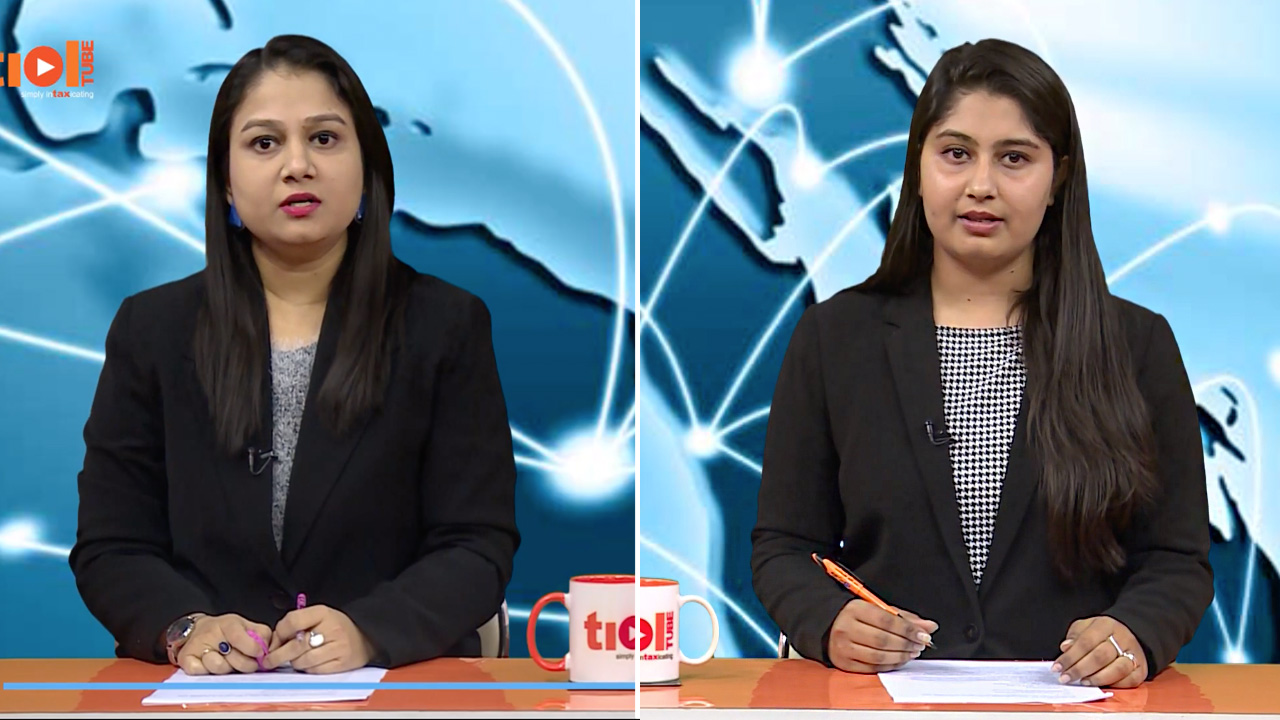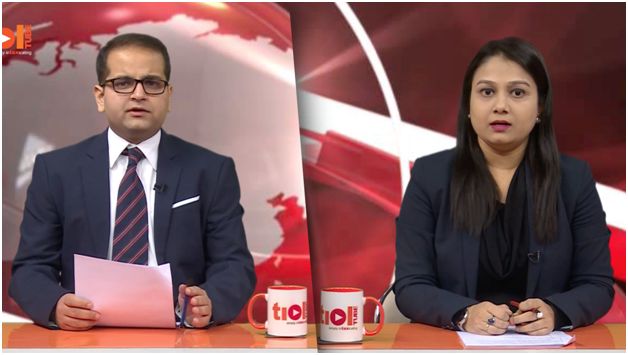 |
 |
2019-TIOL-NEWS-033 Part 2 | Friday February 08, 2019
|
 |
 |
Dear Member,
Sending following links. Warm Regards,
TIOL Content Team
TIOL PRIVATE LIMITED.
For assistance please call us at + 91 850 600 0282 or email us at helpdesk@tiol.in. |
 |
|
 |
 |
 |
TIOL TUBE VIDEO |
 |
|
 |
CASE STORIES |
 |
|
|
 |
 |
DIRECT TAX |
 |
|
 |
 |
 |
 |
 |
 |
 |
|
2019-TIOL-58-SC-IT
PR CIT Vs ICICI Prudential Life Insurance Company Ltd
Income Tax Act, 1961; Insurance Act, 1938; - Sections 10(34), 14A, 44, 115B & 260A; Rule 2 to Schedule I - THE assessee-company is a major player in the life insurance business. During assessment for the relevant AY, the AO made disallowance u/s 14A. Further, some amount of dividend income claimed by the assessee to be exempt u/s 10(34) was disallowed. Subsequently, the Tribunal reversed the findings of the AO. It also interpreted the provisions of Section 44 r/w Rule 2 of the First Schedule alongwith provisions of Insurance Act 1938, Insurance regulatory and Development Authority Act 1999 and regulations there under and accordingly allowing adjustment from the 'surplus' worked as per actuarial valuation land as shown by the assessee. It also held that transfer from Share Holders Account to Policy Holder's Account and shown as part of surplus in the actuarial valuation was only transfer of capital asset and not taxable u/s 44. On appeal, the High Court admitted the Revenue's appeal based on some of the grounds stated. It rejected some other grounds on account of change in position taken by the Revenue, holding in this regard that while change in view could be accepted if there is material to justify the same, m ere change of the AO or of the Revenue's Counsel is insufficient to justify a change of view.
Held - In writ, the Apex Court condones the delay & directs that the matter be tagged with C.A. No.8423 of 2016.
- Notice issued: SUPREME COURT OF INDIA
2019-TIOL-343-ITAT-DEL
Jubilant Biosys Ltd Vs DCIT
Whether enhancement of income by CIT(A) by exercising powers u/s 251(1) is valid if an issue under consideration is subject matter during assessment proceedings - YES : ITAT
Whether merely because assessment order is silent about particular item and there is no discussion thereupon, does not mean that AO has not considered it - YES: ITAT
- Assessee's appeal partly allowed : DELHI ITAT
2019-TIOL-342-ITAT-DEL
DCIT Vs KS Hotels Pvt Ltd
On appeal, the Tribunal noted that an identical issue stood settled in the assessee's own case for an earlier AY, wherein it was held that no disallowance could be made u/s 40(a)(ia) since no TDS u/s 194C is applicable on payment for supply & purchase of material on which VAT is paid.
- Revenue's appeal dismissed : DELHI ITAT
2019-TIOL-341-ITAT-DEL
Radico Nv Distilleries Maharashtra Ltd Vs DCIT
Whether though the SETCOM deems issue of notice u/s 153A as impermissible, but also rejects the assessee's application for settlement, such action divests the AO of jurisdiction to pass assessment orders - NO: ITAT
Whether such assessment orders must nonetheless be quashed, where the SETCOM order giving them the thumbs up itself was set aside by the High Court - YES: ITAT
- Assessee's appeals allowed : DELHI ITAT
2019-TIOL-340-ITAT-MUM
Anibrain Digital Technologies Pvt Ltd Vs DCIT
Whether the discretion of AO to make ad hoc additions is applicable to those expenses which is supported by consistent method of accounting standard emanating credibility of transaction - NO: ITAT
- Assessee's Appeal Partly Allowed : MUMBAI ITAT
2019-TIOL-339-ITAT-AHM
JM Corporation Vs DCIT
Whether the matter warrants remand to the CIT(A) to determine validity of additions u/s 153A & 153C, where search proceedings do not reveal any incriminating material - YES: ITAT
- Case remanded : AHMEDABAD ITAT
2019-TIOL-338-ITAT-HYD
Jonnalagadda Sravanth Vs ITO
On appeal, the Tribunal held that the AO adopts 3% of the cost of goods of liquor sold as the income of the assessee. Regarding the estimation of income on liquor sales at Bar & Restaurant, the rate of 10% estimated by the AO is reasonable and is upheld.
- Assessee's appeal partly allowed : HYDERABAD ITAT | |
|
 |
   |
 |
|
 |
 |
GST |
 |
|
 |
 |
 |
 |
 |
 |
 |
| |
CGST RULES NOTIFICATION 08/2019 GST - TDS - Date for filing GSTR-7 for January extended up to Feb 28 HIGH COURT CASES
2019-TIOL-36-HC-KERALA-GST
Husky Injection Molding Systems (India) Pvt Ltd Vs CST
GST - Insofar as release of goods and vehicle, Single Judge had directed that, for remitting the amount, temporary registration will be permitted - however, appellant is not ready to make remittance of money as such, but undertakes to furnish Bank guarantee.
Held: On furnishing the Bank Guarantee for tax and penalty as provided under Rule 141 of the Central Goods and Services Tax Rules, 2017, and simple bond without sureties for the value of the goods, the goods and the vehicle shall be released expeditiously - Writ appeal disposed of: High Court
- Appeal disposed of: KERALA HIGH COURT
2019-TIOL-35-HC-KERALA-GST
Pmr Enterprises Vs UoI
GST - Petitioner asserts that though it attempted to upload FORM GST TRAN-1 within the stipulated time, it failed because of some system error, therefore, they seek directions to enable them to take credit of available input tax.
Held: Court on earlier occasions permitted the petitioners to apply to the additional sixth respondent for the issue resolution arising due to technical glitches on GST Portal - Paragraph 5 of Circular 39/13/2018 dated 03.04.2018 outlines the procedure the Nodal officers have to follow - Petitioner to apply to the Nodal Officer who will look into the issue and facilitate the petitioner's uploading FORM GST TRAN-1, without reference to the time-frame - if the petitioner applies within two weeks, the Nodal Officer will consider it and take steps within a week thereafter - If the uploading of FORM GST TRAN-1 is not possible for reasons not attributable to the petitioner, the authority will also enable it to take credit of the input tax available at the time of its migration - Petition disposed of: High Court [para 4 to 6]
- Petition disposed of: KERALA HIGH COURT
2019-TIOL-34-HC-AHM-GST
Downtown Auto Pvt Ltd Vs UoI
GST - Section 140 (3) of the CGST Act, 2017 - Petitioner submitted that all the five conditions enumerated under sub-section (3) of section 140 of the Act are satisfied by them - adverting to clause (iii) of sub-section (3) of section 140 of the Act, it is submitted that the same provides that the said registered person should be in possession of invoice or other “prescribed” documents evidencing payment of duty under the existing law in respect of such inputs; that no documents have been prescribed and, therefore, under the circumstances, when the petitioner has produced documents evidencing payment of duty, he is entitled to the credit in respect thereof. Held: Issue Notice returnable on 27th February, 2019 - By way of ad-interim relief, the respondents are restrained from making any coercive recovery against the petitioner in connection with the subject matter of this petition: High Court [para 2]
- Notice issued: GUJARAT HIGH COURT
2019-TIOL-33-HC-AHM-GST
Golden Cotton Industries Vs UoI
GST - Petitioner submits that goods in respect of which the impugned order of prohibition under rule 139(4) of the CGST Rules has been issued, are the goods which are accounted for in the books of account and are not secreted anywhere, and hence, the order of prohibition is contrary to the provisions of sub-section (2) of section 67 of the Act. Held: Issue Notice returnable on 21st February, 2019: High Court [para 2]
- Notice issued: GUJARAT HIGH COURT
2019-TIOL-32-HC-AHM-GST
HM Industrial Pvt Ltd Vs CCGST & CE
GST - Provisonal attachment of property ordered u/s 83 of the CGST Act, 2017 - Bank accounts attached of the Directors of the company - Petitioner-company is registered under the provisions of the CGST Act and is, therefore, the taxable person - Under the circumstances, if at all, the provisions of section 83 of the CGST Act could have been invoked against the petitioner herein, however, under no circumstances, the same could have been invoked against the directors of the petitioner-company - reliance placed by the respondent Revenue upon section 89 of the Act is thoroughly misconceived inasmuch as the same relates to recovery of any tax, interest or penalty due from a private company in respect of supply of goods or service - directors of the company do not ipso facto become liable to pay such amount - in any case, at this stage, section 83 of the Act does not apply to the directors of the private company - Under the circumstances, the impugned orders of attachment, to the extent the same attach the bank accounts of the directors are totally without any authority of law - respondents are directed to forthwith release the attachment of the following bank accounts: High Court [para 2]
- Matter posted: GUJARAT HIGH COURT
2019-TIOL-31-HC-AHM-GST
Lalitbhai Natvarlal Patel Vs Additional Director General
GST - The bank accounts of the petitioners, were provisionally attached by issuing notice u/s 83 of the Gujarat GST Act, 2017 for recovery of duty demanded - The petitioner challenged such action on grounds that it was facing difficulty in managing its day to day affairs - The petitioner also offered some property held by him for attachment in lieu of lifting the attachment of bank accounts - The petitioner submitted affidavits to show that such property was owned by him and his family members.
Held - The Revenue is directed to release the attachment of bank accounts of the petitioner, by way of of interim arrangement, subject to attachment of the property - Further, the owners of the property are directed to file an undertaking in respect of the property offered for release of the banks accounts within a period of one week - Lastly, to secure the interest of the Revenue, the petitioner is ordered to maintain an amount of Rs 50,00,000/- in its Current Account: HC
- Assessee's Writ petition allowed: GUJARAT HIGH COURT
| |
|
 |
   |
 |
|
 |
 |
INDIRECT TAX
|
 |
|
 |
 |
 |
 |
 |
 |
 |
|
SERVICE TAX
Deep Chemicals Vs CST & ST
ST - The assessee-company entered into a contract with M/s Tata Chemicals Ltd, wherein the assessee paid service tax in its capacity as C&F agent - It also recovered some charges from M/s Tata Chemicals as reimbursement - SCN was issued upon invoking extended period of limitation, raising duty demands.
Held: In the present case, the contract involved is not a composite one - The payment for each contract is measures as per the quantum of service provided - The payments for the entire contract was not one composite fixed payment but its depends of each component individually - The billing of separate services is done separately - Moreover, the single agreement embodies separate contract for each find of service being provided as well as separate compensation for each - Hence the Revenue cannot be said to have vivisected the composite service, since there is no single composite service - The amounts recovered under the independent separate clause of the agreement of the rate schedule constitute independent & separate service - Hence the demand is sustainable on merits - Moreover, extended limitation cannot be invoked where the issue raised in both SCNs issued to the assessee, is the same - Hence penalty u/s 78 of the Finance Act 1994 is untenable - Besides, penalty imposed u/s 76 must be restricted to duty levied within period of limitation: CESTAT (Para 2,9,11,12)
- Assessee's appeal partly allowed : AHMEDABAD CESTAT
Karnataka State Tourism Development Corporation Vs CCT
ST - The assessee is a State Government undertaking which is engaged in providing various taxable services and after audit, assessee themselves computed the tax liability and paid Service Tax on 25th March 2006 whereas the SCN was issued on 16th January 2008 much beyond the period of one year - Further, assessee have not suppressed any material fact with intent to evade payment of tax - The Revenue has wrongly invoked the extended period of 5 years which is only applicable in the case of fraud, collusion, wilful mis-statement, suppression of facts or contravention of provision with intent to evade payment of Service Tax whereas in the present case, no material found to hold that there was an intention on the part of assessee to evade the payment of Service Tax - In assessee's own case, this Tribunal has held that the assessee being a Statuary Government Body there could not be any mala fide intention to evade payment of tax - The decision of Calcutta High Court in case of Infinity Infotech Parks - 2012-TIOL-987-HC-DEL-ST is squarely applicable in present case - Similarly, the grounds on which extended period of limitation can be invoked have not been specifically pleaded by Revenue in SCN - On merits also, assessee has a good case but since the appeal is allowed on limitation itself, no need to go to the merits of case: CESTAT
- Appeal allowed : BANGALORE CESTAT
2019-TIOL-414-CESTAT-BANG
Honest Distributors Vs CC, CE & ST
ST - The assessee is engaged in providing services of recovery agent to M/s. ICICI Bank Ltd. - Assessee is collecting dues from borrowers of ICICI Bank Ltd. and to take possession of assets from the borrowers of bank - It is not disputed that assessee has paid the entire service tax before the adjudication order - There is no suppression of facts with intent to evade payment of tax because after taking the registration, assessee started paying service tax and the departmental officer called for details and based on details furnished by assessee, SCN was issued alleging suppression and invoking the extended period - Further, the Department has also invoked suppression even for the second SCN - The assessee has submitted that there was delay in payment of service tax because the service recipient refused to make payment towards service tax in spite of repeated demand - Further the apex court in case of Hindustan Steel Ltd. - 2002-TIOL-148-SC-CT-LB has held that the direction to impose a penalty must be exercised judiciously - A penalty will ordinarily be imposed in cases where the party acts deliberately in defiance of law, or is guilty of contumacious or dishonest conduct or acts in a conscious disregard of its obligation, but not in cases where there is a technical or venal breach of the provisions of the Act or where the breach flows from a bonafide belief that the offender is not liable to act in the matter prescribed by the statute - Penalty is not imposable since the assessee had a reasonable cause which resulted in failure on the part of assessee to pay service tax in time for which assessee is liable to pay the interest - Therefore, by invoking the provisions of Section 80, penalty imposed on assessee waived under Section 78 - But since there is a delay in payment of service tax, assessee is liable to pay the interest on delayed payment - Further as per assessee, he has paid Rs.3,54,199/- before the issue of SCN whereas as per Commissioner (A), he has paid Rs.1,19,153/- before the issuance of SCN - The original authority will also verify as to how much the payment was made before the issue of SCN and thereafter will calculate the interest which assessee is liable to pay for delay in payment of service tax - Accordingly, both the appeals are disposed of by dropping the penalty under Section 78 and by holding that assessee is liable to pay interest for the delayed period: CESTAT
- Appeal partly allowed : BANGALORE CESTAT
CENTRAL EXCISE
2019-TIOL-57-SC-CX
Deena Jee Sansthan Vs CCE
CX - In the present case, the finding of fact recorded by the Commissioner in his order dated 27.11.1997, after evaluating the material on record was that the product in question was not used as ayurvedic medicine but was a "shampoo"- position in the present case about the composition of the product and the curative properties thereof have been seriously disputed and not admitted as was the case in Meghdoot's case (2004-TIOL-103-SC-CX) wherein there was no dispute that the products had medicinal value and were used for ayurvedic treatment, hence treated as ayurvedic products - no fault can be found with the impugned judgment of the High Court holding that extended period of limitation would be applicable, inasmuch as the goods in question were excisable and removal thereof without paying duty was in contravention of the provisions of the Act – Special Leave Petition disposed of accordingly: Supreme Court [para 4, 5]
- Petition disposed of: SUPREME COURT OF INDIA
Yash International Vs CCT
CX - Assessee is manufacturer of electrical fans - An offence case was registered on assessee on the charge of irregular availment of CENVAT credit without receiving the inputs - The issue involved in this case is regarding the refund of amount of Rs.25 lakhs which is rejected - The only reason for rejecting the refund claim is that the assessee has not debited PLA with the amount of Rs.25 lakhs and debited the same in April, 2017 only - Hence, the refund claim is premature - The first appellate authority has not considered the issue holistically, as it is on record and admitted, O-I-O confirmed demands raised by assessee contained in the order portion, an appropriation of amount of Rs.25 lakhs already paid by assessee - If an amount of Rs.25 lakhs stands appropriated on 30.10.2009, the case made out by revenue that assessee had not debited amount in PLA and hence not eligible for refund is totally incorrect proposition - It is also to be noted that Tribunal has also recorded that this amount is debited by assessee to the Government Treasury - On perusal of certificate issued by State Bank of India which is annexed to appeal memoranda, it is found that SBI has categorically stated that amounts are debited to assessee’s account on 13th and 14th September, 2007 which would mean that the amounts have been credited with CBEC/Government of India - On such overwhelming evidence indicating the payment to the Government Treasury, both the lower authorities were in error in not sanctioning the refund claims of Rs.25 lakhs to assessee - Impugned order is set aside: CESTAT
- Appeal allowed : HYDERABAD CESTAT
2019-TIOL-416-CESTAT-ALL
Vaishno Devi Enterprises Vs CCE
CX - The dispute in present appeal relates to classification of product being manufactured by assessee - Whereas the revenue has classified the product as "PU Foam Sheets" classifiable under Chapter Heading No.39211310 which is not entitled to Small Scale Exemption, the assessee have contended that the product being manufactured by them is "Waste Scrap Foam Sheet" and is properly classifiable under Tariff Heading No.39211900, which is eligible for benefit of Small Scale Exemption Notfn 8/2003-CE - On going through both the orders of Original Adjudicating Authority and as also of Commissioner (A), the Appellate authority has simplicitor gone by the facts of pre dominance of PU polyurethane in the product as reported by Chemical Examiner - He has not gone through the other part of said report which indicates that sample is of different colours and also contains plastic material and also adhesives material - Apart from that, there is no rebuttal to findings of adjudicating authority that the assessee do not have the machinery to manufacture PU Foam and the manufacturing process adopted by them clearly show that what is being manufactured is Waste Foam Sheet - The Original Adjudicating Authority has also examined the raw materials required for manufacture of PU Foam and has clearly come to a finding that no such material was purchased by assessee from the market - Such evidences adopted by Joint Commissioner, has not been considered by Commissioner (A) and there is neither any finding on the same nor any rebuttal - As such, no merit found in impugned order of Commissioner (A), same is accordingly set aside: CESTAT
- Appeal allowed : ALLAHABAD CESTAT
CUSTOMS
2019-TIOL-425-CESTAT-MAD
Msk International Vs CC
Cus - The assessee-company attempted to clear 'Ceftriaxome Sterile' by declaring its chemical name instead of its generic name - The Department alleged that the goods were imported from China and the chemical name had been declared in a bid to evade Anti Dumping Duty - The Department also alleged that the assessee had undervalued the clearances - The premises of the assessee-company were searched & summons were served to its proprietor - In his statements, the proprietor claimed to have obtained an IEC code but the same was used by two other persons known to him, to import the consignment of goods - He claimed to know nothing about the imported goods - Statements taken from of one of these persons led the Department to another individual, who in his statements admitted that the goods were under-valued & having originated from China, also attracted Anti Dumping Duty - Hence demand for differential amount of duty was raised with interest - The goods were held liable for confiscation u/s 14 of the Drugs & Cosmetics Act, 1940 r/w Section 111 (d) & 111 (m) of the Customs Act, 1962 - As the goods were not available for confiscation, no order was passed u/s 125 of the Act - Penalty was imposed on the assessee-company along with personal penalties were imposed on the proprietor of the assessee company and upon all the connected persons.
Held - It is clear that the entire exercise was masterminded and executed by the third persons who were known to the proprietor of the assessee-company - Though penalty merits being imposed, it is seen that penalty imposed u/s 13(b) of Drugs & Cosmetics Act, can only be warded by a court not inferior court of a Metropolitan Magistrate or of a Judicial magistrate of the first class - Moreover, penalty u/s 114A of Customs Act mandates penalty equivalent to duty or interest so determined - In the present case, no duty demand has been raised with interest against this individual - Hence penalty u/s 114A cannot be sustained & must be set aside - Moreover, the penalty imposed on the proprietor of the assessee-company merits being reduced in quantum, considering that he was not directly involved in importing the consignment - It is also seen that the modus operandi of declaring the chemical formula was effective enough to hoodwink the Department - Hence the proprietor cannot be saddled with huge quantum of penalty simply for lending IEC code - Consequently, the appeal filed by the assessee-company also becomes infructuous: CESTAT (Para 2-3.4,7.1,7.2)
- Assessees' appeals partly allowed: CHENNAI CESTAT
|
|
|
 |
   |
 |
|
 |
|
|
 |
|
 |
 |
TIOL PRIVATE LIMITED.
TIOL HOUSE, 490, Udyog Vihar, Phase - V,
Gurgaon, Haryana - 122001, INDIA
Board :
+91 124-6427300
Fax: + 91 124-6427310
Web: http: //www.taxindiaonline.com
Email: updates@tiol.in
__________________________________
CONFIDENTIALITY/PROPRIETARY NOTE.
The Document accompanying this electronic transmission contains information from TIOL PRIVATE LIMITED., which is confidential, proprietary or copyrighted and is intended solely for the use of the individual or entity named on this transmission. If you are not the intended recipient, you are notified that disclosing, copying, distributing or taking any action in reliance on the contents of this information is strictly prohibited. This prohibition includes, without limitation, displaying this transmission or any portion thereof, on any public bulletin board. If you are not the intended recipient of this document, please return this document to TIOL PRIVATE LIMITED. immediately |
 |
|
 |








